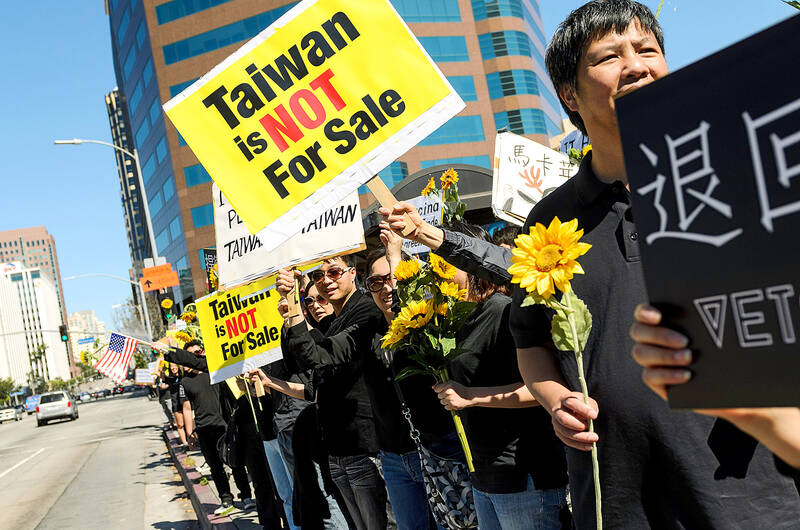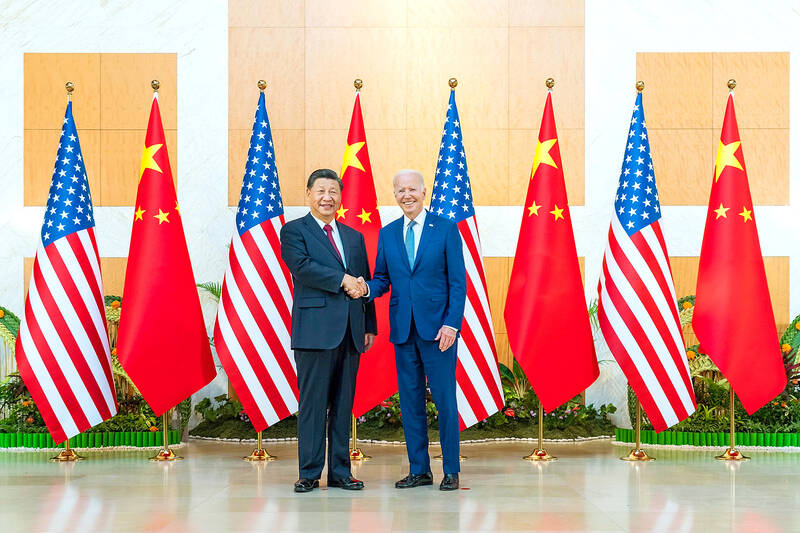Last week, the presidential campaign of Taiwan People’s Party (TPP) candidate Ko Wen-je (柯文哲) tapped Cynthia Wu (吳欣盈), the granddaughter of Shin Kong group founder Wu Ho-su (吳火獅), as his vice-presidential candidate. Wu and her vast wealth seem to fly in the face of Ko’s claim to be offering new, cleaner politics.
She wasted no time putting the peasants in their proper place. Asked last week by a reporter if she would publicly reveal that she had given up her US citizenship, Wu tartly responded that it was an issue between herself and the US government. The following day, when asked by a reporter about telling her family she was going to be Ko’s veep pick, she snapped back: “Did you tell your parents when you decided to be a reporter?”
A wiser politician would have used that as a moment to humanize herself and her family.

Photo courtesy of Wikimedia Commons
Both Ko and Chinese Nationalist Party (KMT) presidential candidate Hou You-yi (侯友宜) last week brought up economic agreements with the People’s Republic of China (PRC). Hou again announced that if elected he would revive the unpopular services pact that triggered the Sunflower movement in 2014 and crushing KMT defeats at the ballot box in that year and 2016.
Meanwhile Ko said that instead of entering the Comprehensive and Progressive Agreement for Trans-Pacific Partnership (CPTPP), Taiwan should enter the PRC-led Regional Comprehensive Economic Partnership (RCEP) by opening talks with Beijing. Ko contended that Taiwan, a globalized economy and world leader in tech industries, is not ready for the stricter information security rules, greater labor rights and lower tariffs of the CPTPP.
Not surprisingly, both pro-China candidates Ko and You, appealing to the same base, are offering closer links with the PRC as an economic panacea. Ko added that the southbound policies of President Tsai Ing-wen (蔡英文) are impossible without first going west. This echoes former president Ma Ying-jeou’s (馬英九) claim in support of his pro-China economic policies that Taiwan needed to go to the world through China.

Photo courtesy of Wikimedia Commons
Mind you, this is the same Ko that in April said in an interview with Bonnie Ling hosted by the Center for Strategic & International Studies that the Economic Cooperation Framework Agreement (ECFA) had made Taiwan overdependent on China. Ironically, this statement was made in the same week that outbound investment from Taiwan to southeast Asia exceeded Taiwan investment in the PRC, according to the Ministry of Economic Affairs.
Local media also reported that Ko observed, in a response to a question about what he would do differently to achieve better relations with the PRC, that cross-strait relations are the “Taiwan issue” of the US-China rivalry, which Taiwan must navigate.
Ko’s language locates Taiwan “between” the PRC and the US, as if Taiwan has no conflict of its own with the PRC. This is dangerously close to the PRC’s own propaganda claim that Taiwan is no more than a pawn of the US in a Great Power game.
This “betweenness” of Taiwan is a common claim in the numerous conversations about US-PRC relations and the Taiwan issue. It is wrong in many different ways.
For one, Taiwan is not between the PRC and the US, but is also an important issue for Japan and the Philippines. The PRC position is to turn those two nations into pawns of Uncle Sam as well. It is easy to see how this can only succeed by removing agency from all players except the US, a common and particularly stupid ideological position on the left.
Another step, a common one among PRC apologists, is to simply remove Japan and the Philippines from the discussion. Indeed, if an article about the Taiwan issue is silent on Japan and its interest in keeping Taiwan free, that is generally a signal that one is reading PRC propaganda.
Ideological positions that remove agency from Taiwan are easy to spot and counter by restoring the Taiwanese themselves to the discussion. Indeed, because it is so clear, people often stop there. “Sure,” one might say, “Taiwan is between the US and the PRC, but we have our own agency.” That is sufficient to squelch most leftist ideological idiocy. Yet perhaps it should be taken one step further.
The “Taiwan is between” position seems more rational because it positions Taiwanese as victims of the Great Power aspirations of both sides. But the implicit framework it posits is a false one.
Imagine a world in which the PRC was not an expansionist power. A world in which it is a populous state bordered by the independent states of Tibet and East Turkestan. A world in which it did not have a navy that was built to destroy the US navy. A world in which it did not demand that Taiwan, the South China Sea and the Senkakus be handed over to it.
Where would Taiwan be then? It would be something like Malaysia, South Korea or the Philippines are in our current world. The “Great Power competition” between the PRC and the US would simply be a matter of economic issues to be negotiated between the two governments. There would be no military issues. There would be no need for “freedom of navigation” transits through the Taiwan Strait or the South China Sea. The media would not constantly refer to the tensions between the PRC and the US that appear to arise without origin, the Augustinian First Cause of cross-strait relations.
If Taiwan is located “between” the PRC and the US, the allegedly hapless victim of a Great Power competition, it is only because PRC expansionism has put it there.
In other words, just as describing Taiwan as a pawn of the US is a pro-PRC ideological position that succeeds by removing Taiwan’s own agency, positing that Taiwan is “between” the US and China is a pro-PRC ideological claim that only makes sense because it quietly removes PRC agency — expansionism — from the equation and treats the US-PRC rivalry as a pre-existent uncaused cause.
What is the historical counterexample? Japan. In the 1980s there were books arguing that Japan and the US were going to war and that Japan would eventually displace the US as the globe’s leading power. Japan engaged in many practices that China does, including technology theft and setting up market barriers. But there were never war tensions between the US and Japan, nations did not “pick sides,” and problems between them were addressed via negotiations.
Why did things break that way? Because Japan was not an expansionist power.
Notes from Central Taiwan is a column written by long-term resident Michael Turton, who provides incisive commentary informed by three decades of living in and writing about his adoptive country. The views expressed here are his own.

On the evening of June 1, Control Yuan Secretary-General Lee Chun-yi (李俊俋) apologized and resigned in disgrace. His crime was instructing his driver to use a Control Yuan vehicle to transport his dog to a pet grooming salon. The Control Yuan is the government branch that investigates, audits and impeaches government officials for, among other things, misuse of government funds, so his misuse of a government vehicle was highly inappropriate. If this story were told to anyone living in the golden era of swaggering gangsters, flashy nouveau riche businessmen, and corrupt “black gold” politics of the 1980s and 1990s, they would have laughed.

This is a deeply unsettling period in Taiwan. Uncertainties are everywhere while everyone waits for a small army of other shoes to drop on nearly every front. During challenging times, interesting political changes can happen, yet all three major political parties are beset with scandals, strife and self-inflicted wounds. As the ruling party, the Democratic Progressive Party (DPP) is held accountable for not only the challenges to the party, but also the nation. Taiwan is geopolitically and economically under threat. Domestically, the administration is under siege by the opposition-controlled legislature and growing discontent with what opponents characterize as arrogant, autocratic

When Lisa, 20, laces into her ultra-high heels for her shift at a strip club in Ukraine’s Kharkiv, she knows that aside from dancing, she will have to comfort traumatized soldiers. Since Russia’s 2022 invasion, exhausted troops are the main clientele of the Flash Dancers club in the center of the northeastern city, just 20 kilometers from Russian forces. For some customers, it provides an “escape” from the war, said Valerya Zavatska — a 25-year-old law graduate who runs the club with her mother, an ex-dancer. But many are not there just for the show. They “want to talk about what hurts,” she

It was just before 6am on a sunny November morning and I could hardly contain my excitement as I arrived at the wharf where I would catch the boat to one of Penghu’s most difficult-to-access islands, a trip that had been on my list for nearly a decade. Little did I know, my dream would soon be crushed. Unsure about which boat was heading to Huayu (花嶼), I found someone who appeared to be a local and asked if this was the right place to wait. “Oh, the boat to Huayu’s been canceled today,” she told me. I couldn’t believe my ears. Surely,